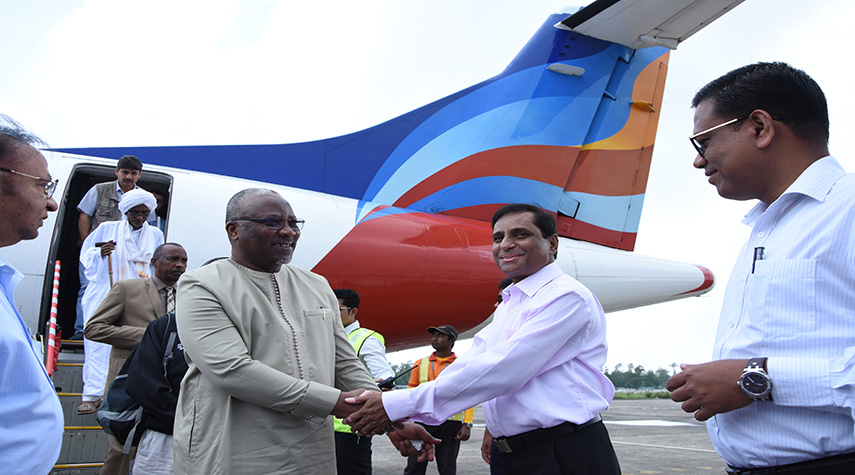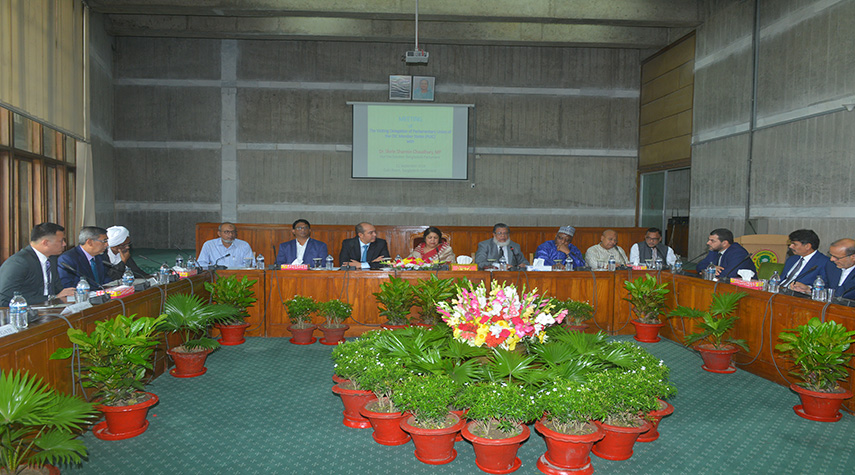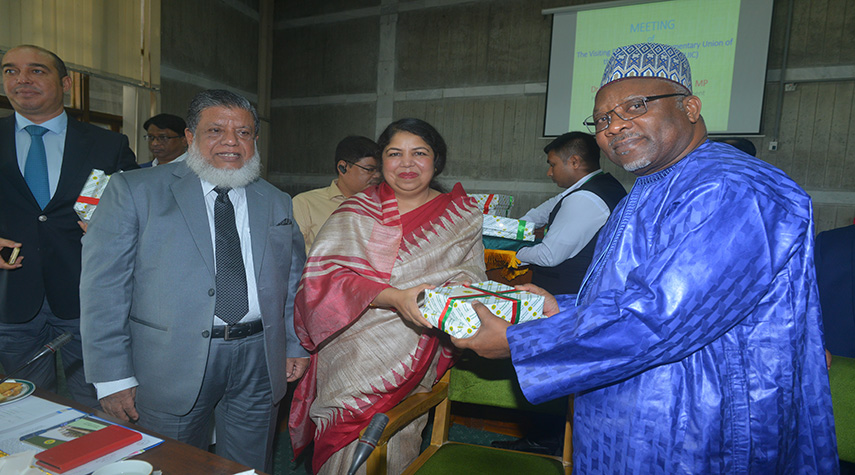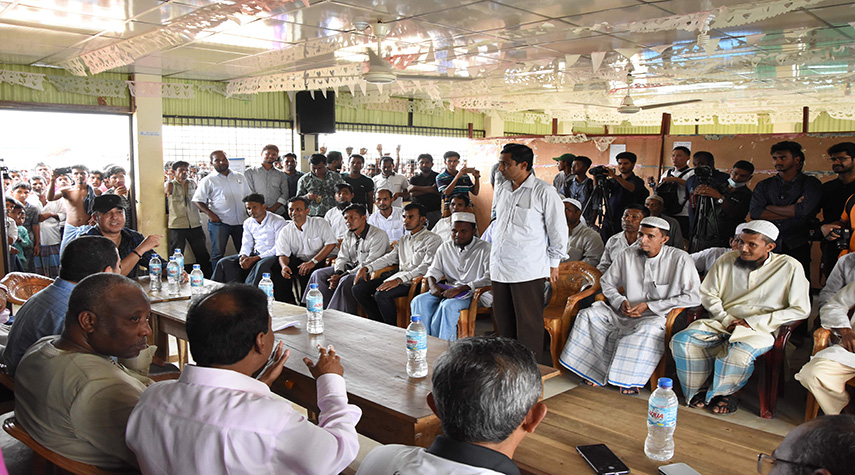REPORT ON THE VISIT OF THE PUIC DELEGATION TO THE ROHINGYA REFUGEES CAMPS
DHAKA – PEOPLE’S REPUBLIC OF BANGLADESH, 11 – 12 SEPTEMBER, 2018
Upon the resolution No. 27/PFR/13-CONF adopted by the 13th PUIC Conference held in Tehran, I. R. Iran on January 2018, which “mandated the General Secretariat to follow up the dispatch of a PUIC delegation to Bangladesh to visit Rohingya refugee camps to take stock of their conditions and consider the possibility of extending humanitarian aid to them”,

PUIC Secretary General was on the view that a delegation of the PUIC Executive members to be formed for this matter,
In response to the call of His Excellency to the Parliament Members of the Executive Committee, the following Excellencies participated in the delegation;
|
Country
|
Name of Participants
|
|
1.Algeria: Mr. Deputy Adjissa Youcef
|
4-Morocco:Deputy Speaker Mohammed Ouzzine
|
|
2.Iran: Mr Deputy Seyed Hemayat Mirzadeh.
|
5- Sudan:Mr. Deputy Mohamed Alhassan Ahmed Mohamed
Mr.Deputy Asim Omer Ahmed Adam
|
|
3.Malaysia: Deputy Speaker Dato Haji Mohd Rashid Bin Hasnon
|
6- Turkey: Mr. Deputy Orhan Atalay
|
and on 10 September 2018 this delegation arrived Bangladesh.
MEETING WITH THE SPEAKER OF THE PEOPLE’S REPUBLIC OF BANGLADESH

On 11 September, 2018 the PUIC Parliamentary Delegation met at the Parliament Building H.E. MRS. SHIRIN SHARMIN CHAUDHURY the Speaker of the Parliament of People’s Republic of Bangladesh. After introduction of the members of the delegation from both sides, Her Excellency briefed the delegation as follows:-
The ongoing humanitarian crisis resulting from latest Myanmar military operations against Rohingya civilians has caused suffering on a catastrophic scale. By the end of 2017, there have been nearly one million Rohingya refugees in Cox’s Bazar – of whom 700,000 have arrived since 25 August 2017, added to the 300,000 who came after similar waves of violence in the past. This means that more Rohingyas now live in Bangladesh than in their homeland. Not only the pace of new arrivals since 25 August 2017 has made this the fastest growing refugee crisis in the world but the concentration of refugees in Cox’s Bazar is now amongst the densest in the world. Refugees arriving in Bangladesh—mostly women and children—are traumatized, and some have arrived with serious injuries caused by gunshots, shrapnel, fire and landmines. But everyone has a story to tell that includes some of the worst forms of human rights violations suffered over a long time.

Mr. Mouhamed Khouraichi NIASS, PUIC Secretary General, thanked the Speaker of the Parliament of the People’s Republic of Bangladesh for the warm reception given to him as well as to the other members of the delegation, and said he was honored to listen to explanations and opinions concerning the human tragedy that our brothers in Islam are subjected to because of fanaticism and extremism, and added: there is no doubt that Muslims in general, and all the international community, are grateful to Bangladesh and its people for receiving these numbers of Rohingya refugees. He expressed his solidarity with Bangladesh and stood with it to face the pressure which is on these refugees. Mr. NIASS further said that this issue requires international sensitization and exploitation of all political and media platforms to inform the world of the magnitude of the tragedy, and to stand with the victims and to condemn the injustices against humanity which were committed in Myanmar.
On the other hand, all Members of the PUIC Delegation thanked the Speaker and the people of the People’s Republic of Bangladesh for the warm welcoming and promised to ask their parliaments and governments to apply pressure on Myanmar to Immediately allow its forcibly displaced Rohingya population in neighboring countries, especially Rohingya refugees in Bangladesh, to return to their homeland in Rakhine State. They emphasized it is critical for Rohingya to feel secure before returning to their homeland. They recommended that the minimum conditions for any repatriation program must include a sustainable and voluntary return of Rohingya refugees in safety, security, dignity.

MEETING WITH MINISTER OF STATE FOR FOREIGN AFFAIRS OF THE PEOPLE’S REPUBLIC OF BANGLADESH:
On 11th September, 2018, the PUIC delegation met at the Ministry of Foreign Affairs H.E Mr. Md. Shahriar Alam, Minister of State for Foreign Affairs who gave the following briefing: -
- Hon’ble Prime Minister sheikh Hasina took a bold and humanitarian decision to shelter the Rohingya People for the sake of humanity. However, Bangladesh cannot bear the burden indefinitely.
- The Government of Bangladesh has allocated around 6000 acres of forest land for sheltering the Rohingyas incurring the risk of huge ecological hazard and environmental threats.
- As part of the Government’s plan for providing better humanitarian assistance and shelter, Government of Bangladesh has planned to relocate the displaced Rohingyas to “Vashan Char” which is being prepared maintaining all standards for human habitation.
- Bangladesh firmly believes that durable solution of the Rohingya crisis lies in sustainable return of the displaced people to the original places of their residence with safety, dignity and assurance of livelihoods, and more importantly in restoring civil, political and economic rights of these people as underscored by the Kofi Annan Commission.
- The problem originated in Myanmar, and its solution must be found in Myanmar. Bangladesh seeks a peaceful solution to the crisis.
- Bangladesh also remains engaged with Myanmar and concluded three necessary instruments on repatriation so that forcibly displaced Rohingyas can return to Myanmar in safety, security and dignity and their resettlement and reintegration into Myanmar society.
- All the three instruments created space for international involvement and Bangladesh has already involved UNHCR in the process.
- As things stand now, implementation of the repatriation process now entirely depends on the sincerity and seriousness of the Myanmar authorities. Creating “conducive environment” in Rakhine State is crucial for the success of the repatriation process.
- Bangladesh would like to convey the message to international community that without decisive diplomatic pressure exerted on Myanmar, it would be difficult to make progress on return of Rohingyas. If international community fails to bring the perpetrators to justice, then there might be many more similar massacres around the world.
After listening to the valuable briefing of His Excellency Minister of State for Foreign Affairs of Bangladesh, PUIC Secretary General gave a speech in which he expressed sincere thanks to Mr. Md. Shahriar Alam for receiving PUIC delegation warmly and facilitating its mission. He briefed on the circumstances of forming this delegation based on the decision of PUIC 13th Conference.
His Excellency also thanked Mr. Minister for his briefing on the problems posed by the massive influx of refugees in Bangladesh as well as his explanations and proposals which will be forwarded to PUIC Member Parliaments, inorder to let the Islamic nation to stand with Bangladesh and the Rohingya in this terrible tragedy, and the mobilization of the entire world towards the fairness and justice.
Mr. Secretary General added: “This requires the Umma to provide all kinds of political, media and material support to Bangladesh and to the oppressed Rohingyas who are displaced from their lands. Efforts must be made to put this issue in the international arena and in media outlets to break the blackout on crimes committed by the Myanmar authorities against the Rohingya.”
VISIT TO THE REFUGEES CAMPS IN COX BAZAR
On 12th September, 2018 the PUIC delegation left Dhaka to Cox Bazar and from the airport to the Refugee Camps. The PUIC delegation first visited the camps where the Refugees had just come before one month. The Refugees told of their plight and the disappearance of their family members. The PUIC delegation asked questions and the Refugees answered the questions.
Later they were taken to other Rohingya Refugee Camps in Cox’s Bazar, PUIC delegation had the opportunity to meet and discuss in details with the other Rohingya refugees who told of the sordid state of human rights situation faced by them in Myanmar. The horrifying tales of human rights violations narrated by the Rohingya refugees, included systemic discrimination which denied all sorts of civil, political, economic and social rights to them. In addition, innocent civilians including women, children and elderly, endured widespread and indiscriminate violence in the form of torture, rape and extrajudicial killings. Eye witnesses also provided poignant details of dreadful events of August 2017, when in the garb of pursuing the attackers of two security posts, hundreds of Rohingya villages were torched and thousands of innocent civilians were tortured and brutalized by the Myanmar military using helicopters and rocket propelled grenades.
Some of the worst forms of violence, including extrajudicial killings, torture, rapes and forced displacement have been committed against the Rohingya women and children. PUIC delegation received first-hand information from victims who suffered these violations and fled to Cox’s Bazar. Many Rohingya women narrated in tears how they, including the young girls were gang-raped by soldiers. Some of them also shared the horrific accounts of witnessing their family members killed, thumping the heads of their children against trees, throwing children and elderly parents into burning houses, and shooting their husbands. Based on multiple reliable reports. these widespread violations in particular sexual violence against women and children, especially girls, are systematic, multidimensional and part of the organized campaign of ethnic cleansing, which falls in the category of crimes against humanity under international law.
The PUIC delegation also met with the officials from relevant UN human rights and humanitarian agencies, representatives of international human rights organizations and local government / civil society actors, who all confirmed receiving similar accounts from victims who fled their homes in Myanmar to save their lives. Accordingly, based on first-hand information acquired from direct victims and eye-witnesses accounts, which were repeated/confirmed by separate groups of victims in different camps as well as widely reported in relevant human rights reports by reputed organizations, the PUIC delegation was able to conclude that there exists sufficient proof of institutionalized discrimination and systematic violations against Rohingya Muslims in Myanmar. The systematic and systemic nature of discrimination can also be dubbed as a form of apartheid, which is considered a crime against humanity under international human rights law.
It is worth noting that the refugee camps have been established in an area stretching along the border with Myanmar in a valley which previously had a lot of wildlife and a great number of trees and lakes. However, due to heavy influx of refugees in a short period of time, the ecology of the area has faced extensive damage as most of the bamboo trees have been cut to build makeshift huts for the refugees and for use as firewood. One of the key fears expressed by Bangladeshi officials is that the situation might worsen during the monsoon season, which will bring about landslides and heavy floods unless more engineering works were carried out. Additional resources are, therefore, critically needed as Bangladesh, despite its best efforts, would not be able to cope with the massive humanitarian challenge during the upcoming rainy season.
While the situation of refugees and their stories were heart-wrenching, it was pleasing to note that the Government of Bangladesh is striving its best to facilitate the Rohingya refugees and facilitating the orderly management of humanitarian relief operation. One must also acknowledge and pay tribute to the generosity and compassion of the host communities in Cox’s Bazar in providing shelter and sharing their personal possessions and giving their time to teach the children their language as well as Quran – in many cases limited – resources to help the Rohingya population who fled from Myanmar for fear for their lives and dignity.
At the same time, however, the visiting delegation noted with regret the abysmal psychological state of refugees, who were visibly shattered by the horrific violations faced and witnessed by them in the recent past. Most of them, when asked about their willingness to return, frightfully refused to return unless fool proof guarantees were provided for their safety and basic human rights.
Recommendations of the Delegation:
- Enhancing media attention and mobilizing the entire energies of Muslim Communities to highlight the importance of the issue of the Rohingya Refugees and to focus on the magnitude of injustice and their suffering as well as conveying the real picture of this human catastrophe to the whole world.
- Requesting the member parliaments to promote the level of coordination and cooperation among themselves in international fora and calling for prosecuting the perpetrators of these atrocities and violations and bringing them before international justice.
- Also enhancing political attention for the sake of intensifying international action to exercise pressure on the government of Myanmar in order to reach a political solution that stops the influx of refugees and prepares the atmosphere for the return of the Refugees to their homeland.
- Requesting the member parliaments to urge their respective governments to offer further material assistance to the government of Bangladesh and to all charitable and rescue institutions which are providing assistance to the Rohingya Refugees.
PROGRAMME
SUNDAY /MONDAY, 9/10 SEPTEMBER 2018
Arrival of the delegations at Hazrat Shah Jalal International Airport.
To be received by the Hon’ble Whip/MP and Officials of Bangladesh Parliament.
Stay in the Hotel Pan Pacific Sonargaon
TUESDAY, 11 SEPTEMBER 2018
1030 hours : Leave Hotel for Bangladesh Parliament
1100 hours : Meeting with the Hon’ble Speaker of Bangladesh Parliament at her Office
1230 hours : Visit Parliament Building
1300 hours : Lunch to be hosted by the Hon’ble Speaker at VIP Cafeteria, Bangladesh Parliament
1430 hours : Leave Bangladesh Parliament for the Ministry of Foreign Affairs
1500 hours : Call on State Minister/Briefing Meeting in the Ministry of Foreign Affairs
1600 hours : Leave Ministry of Foreign Affairs for the Hotel
1630 hours : Arrive at the Hotel
WEDNESDAY, 12 SEPTEMBER 2018
0700 hours : Leave Hotel for Dhaka Domestic Airport
0815 hours : Leave Dhaka for Cox’s Bazar by Novoair flight no. VQ-931
0920 hours : Arrive at Cox’s Bazar Airport
0930 hours : Leave Cox’s Bazar Airport for the Rohingya Refugee Camps by road
1030 hours : Arrive at the Rohingya Camp and Visit the Camp
1400 hours : Quiet Lunch
1500 hours : Leave the Camp for Cox’s Bazar Airport by road
1600 hours : Arrive at Cox’s Bazar Airport
1630 hours : Leave Cox’s Bazar for Dhaka by Novoair flight no.VQ- 938
1735 hours : Arrive at Dhaka Domestic Airport
1800 hours : Leave Airport for the Hotel
1900 hours : Arrive at the Hotel
THURSDAY/FRIDAY, 13/14 SEPTEMBER 2018
Leave Hotel for Hazrat Shah Jalal International Airport
Departure of the delegation